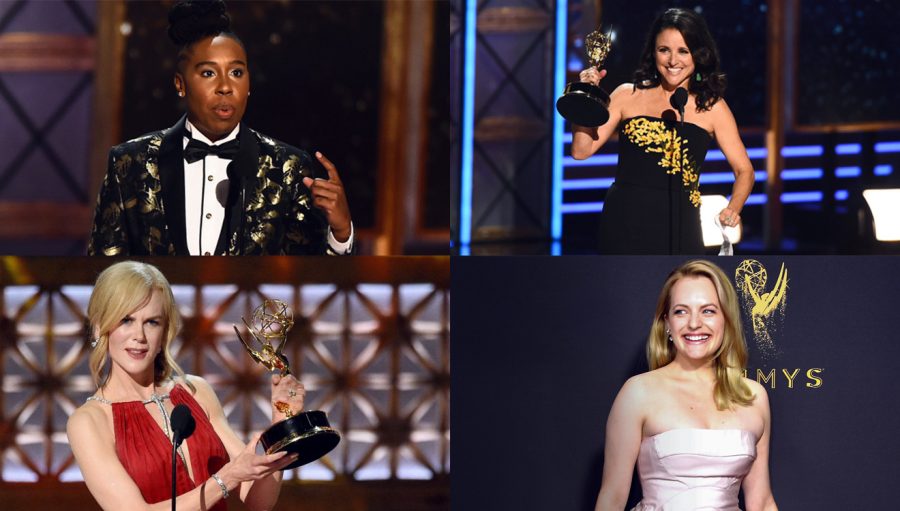When Celeste Wright in Big Little Lies feels the walls and corners of the apartment she intends to shift into after being brutally assaulted by her husband, there’s a moment of calm on her face. Fighting a lone battle in silence, we watch Celeste quiver in fear and breakdown all by herself, clutching on to sweet nothings that her husband feeds her again and again. She isn’t weak, we learn. She’s still got some fight in her, especially after she feels alive when representing Madeline and her theatre company against the mayor. It takes a while for her to fight back, but she does it even if it leaves her marred with scars. Her battle scars.
Nicole Kidman as Celeste won her first Emmy for Best Actress, an award that rightfully belongs to her, for her performance as the vulnerable-but-not-weak housewife who keeps making excuses for her husband’s abuse until she’s had enough. Accepting the award while fighting tears, Nicole’s speech highlighted the premise of her character’s relationship with her husband.
“It is a complicated, insidious disease. It exists far more than we allow ourselves to know. It is filled with shame and secrecy, and by you acknowledging me with this award, shines the light on it even more. So, thank you, thank you, thank you. I bow down to you,” she said to a roar of applause.
The Emmys this year was clearly a fine example of women power, diversity, and some real political sass. Highlighting power and diversity, writer Lena Waithe’s win decrees a bigger and brighter picture for artistes from different backgrounds, race, orientation, and gender.
Lena won the Emmy for co-writing the ‘Thanksgiving’ episode of Master of None with series co-creator and star, Aziz Ansari. Waithe also has a recurring role in the Netflix comedy, and is the first African American to win this award. Her acceptance speech was something that should’ve been heard a longtime ago, but doesn’t hurt to listen to now, given the return of White supremacy, racism, sexism and homophobia.
Waithe spoke about how the “Little Indian boy from South Carolina and the queer Black girl from Chicago” have finally been embraced by acceptance.
“The things that make us different — those are our superpowers,” she said. “Go out there and conquer the world. It would not be as beautiful as it is if we weren’t in it.”
With the speeches and awards at the Emmys getting more fiery and astute with respect to the political situation, it came as no surprise when Julia-Louis Dreyfus won the Best Actress in a Comedy award for Veep for the sixth consecutive time. Last year, she paid tribute to her father, and given the elections at the time, admitted that the show began as a political satire, but “now felt like a sobering documentary.”
Despite facing stiff competition, Julia reigned each year and even went on to make Emmy history this time. Her character, Selina Meyers, is a terrible choice for President, something which even she has admitted to in the past. Selina is petty, self-centered, and downright opportunistic, but she isn’t bitchy or unnecessarily vicious. She faces sexism and lots of name-calling for speaking her mind, even forced to measure her words while her male counterparts get away with far worse.
But at least, there appears to be a place for female Presidents in the fictional world.
*****
The Handmaid‘s Tale’s win is the other cherry on top. Hulu’s show was adjudged the biggest winner of the night with eight awards, including the final award of the night – ‘Outstanding Drama Series’. A show that focuses on women disallowed from having any agency over their body even had Elisabeth Moss, the titular lead, win the Outstanding Actress in a Drama category.
The Handmaid’s Tale, originally a novel written by Margaret Atwood, is set in a dystopian world where women are considered intellectually and emotionally inferior to men, segregated by clothing, and where unmarried women are considered to be non-persons. The novel, published in 1985, is set in a totalitarian society, marred by politics, class, and patriarchy.
Recommended
Much like George Orwell’s 1984, the show (a terrific representation of the book) recounts the horrors that women face in the dystopian world where they are treated like pieces of meat up for grabs.
But just the way all things good come to an end, Sean Spicer’s entry in the name of entertainment and suspense at an awards show was nothing short of a disservice to not just the ladies but also the other attendees of the occasion which celebrated creativity, diversity, and all things original.
Spicer may have quit being the White House’s Press Secretary, but the load of lies he spewed during his term, while working for a pro-White, pro-life, anti-women boss, doesn’t really add to his “fun and friendly” appearance at the show.
That aside, closer home, if only Amitabh Bachchan learnt a thing or two about not stealing thunders.
T 2549 – The team of ‘PINK’ .. all in one frame .. and .. ALL, independent, individual .. NATIONAL AWARD WINNERS !!? pic.twitter.com/uQV55nUQsO
— Amitabh Bachchan (@SrBachchan) September 16, 2017
Pic: E Online/ABC/Variety



